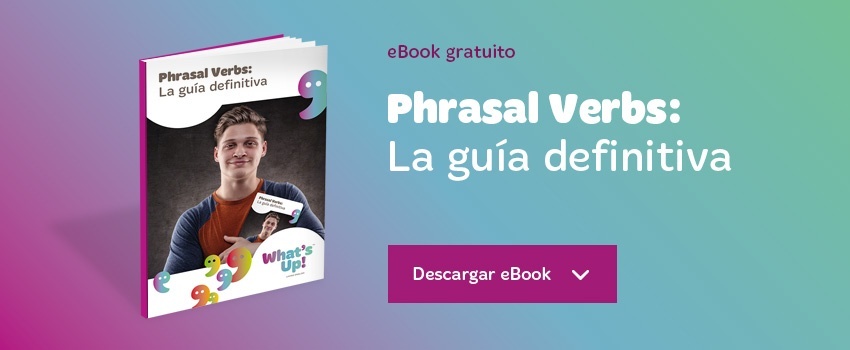What's Up! blog
el mejor contenido del mejor curso de inglés
Fall: phrasal verbs con teoría y ejercicios, ¡que no se te escapen!
Quizás has oído decir que los phrasal verbs complican mucho el aprendizaje del inglés, que no hay manera de memorizarlos. Pues tenemos dos buenas noticias: la primera, es que no son tan difíciles, y la segunda es que no debes memorizarlos. Lo importante es razonar su significado y practicar. Aquí te contamos más claves sobre cómo recordar los phrasal verbs. En concreto te hablamos de fall: phrasal verbs con ejercicios más abajo.
¿Qué son los phrasal verbs?
Los phrasal verbs son un verbo combinado con una preposición, con un adverbio o con ambas cosas.
- Verbo + preposición: Turn on (encender)
- Verbo + adverbio: Pass away (fallecer, morir)
- Verbo + adverbio + preposición: Look forward to (estar deseando)
Son construcciones muy comunes en inglés, sobre todo en la lengua oral. Lo que puede complicar su aprendizaje es que el significado cambia con cada partícula que se añade al verbo y que no siempre se puede deducir el sentido de la frase según el significado de cada parte.
Son muy utilizados en inglés y, de hecho, hay conceptos que solo pueden ser expresados con un phrasal verb. Su uso indica un nivel más elevado del idioma. Por ejemplo, es tan correcto decir “please continue” como “please go on”, pero es casi seguro que un nativo elegirá la segunda opción.
Existen cuatro tipos de phrasal verbs:
- Intransitivos no separables y sin objeto (“The plane took off on time”)
- Transitivos separables con objeto (“Write it down here”). En este caso el phrasal verb se puede escribir junto o separado. Si el objeto es un pronombre, éste se escribe entre el verbo y la partícula. Como en este ejemplo.
- Transitivos no separables con objeto (“I get up at 8,30 am”)
- Transitivos de dos partículas no separables (“I can’t put up with this noise”).
Las formas de Fall
Estas son los diferentes fall: phrasal verbs que podemos encontrar:
- Fall about. Reír a carcajadas
- We fell about when we heard that joke.
- Fall apart. Romper en pedazos
- The chair fell apart as soon as he sat on it.
- Fall apart. Romperse emocionalmente y ser incapaz de comportarse con normalidad
- He fell apart when she left.
- Fall back. Retirada
- The army fell back after losing an important battle.
- Fall back on
- Ser susceptible de ser utilizado en caso de emergencia. It was a good idea to have some food in the pantry to fall back on when everything was closed.
- Fall behind
- Quedar atrasado/a en el progreso de alguna acción. He had an operator and fell behind with his exercises.
- Fall down. Caer el suelo
- I stumbled and fell down.
- Fall for. Sentir atracción por alguien, enamorarse
- He fell for her the very first moment they met.
- Fall for. Creer algo que no sea verdad
- They fell for his story and believed him totally.
- Fall in. Colapsar, en el sentido de caer
- The ceiling fell in but it didn’t hurt anyone.
- Fall into. Empezar a hacer algo no planeado
- He fell into a conversation with the bus driver.
- Fall off. Decrecer
- Orders have fallen off in the last couple of months.
- Fall out. Discutir y tener mala relación con alguien
- He left after falling out with his brother.
- Fall out. Perder el pelo
- The side effect of the treatment is that your hair starts to fall out.
- Fall over. Caer al suelo
- She lost her balance and fell over.
- Fall through. No tener éxito
- We found a house to buy but the plans fell through when the seller dropped the idea of selling.
Algunos ejercicios para practicar phrasal verbs
La mejor manera de aprender a utilizar los phrasal verbs es asociarlos a un ejemplo y practicar mucho. Aquí tienes algunos ejercicios para hacerlo. Debes completar con el phrasal verb adecuado.
- It’s warm today. Why don’t you ______ your jacket ? (take off)
- My holiday ________ when the travel agent closed his office, so I’ll be staying at home this year. (fall through)
- The dinner yesterday was _______ for no reason. (call off)
- If something goes wrong, you can _________ your family for support. (fall back on)
- Yesterday, I ________ a word that I had never heard before. (come across)
- The film’s very funny. I can guarantee you’ll _______ laughing the whole way through. (fall about)
- I completely believed her; I _______ her lies. (fall for)
Posts relacionados:



